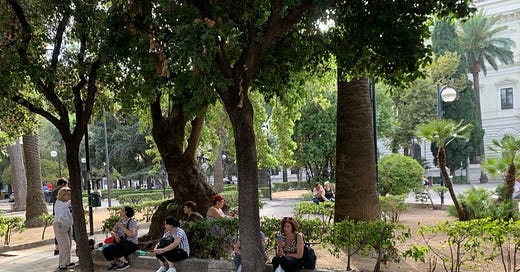I’ve been reflecting on Georgian migrants in Europe. The opposition often portrays them as the most pro-opposition voters in the elections supposedly because they are the most pro-EU. But knowing firsthand the difficult, slave-like conditions in places like Italy, their feelings about Europe aren’t always positive. This led me to a hypothesis about what might actually be motivating this stance—and why they might feel pressured to align with pro-EU narratives.
Actually, it was Georgian Dream's pro-EU stance that spurred emigration. Before the EU visa liberalization in 2017, anyone hoping to work in Europe as a caregiver had to pay around $5,000 in fees to companies arranging papers—sometimes even fake ones. Many women borrowed this money to leave, but the high costs discouraged large-scale migration and even kept families from encouraging mothers and wives to go. Before then, people didn’t even view this option as particularly viable.
With visa liberalization, that financial barrier was removed, leading to an increase in migration. This option suddenly became more accessible, and as more women went, they created networks that encouraged others to follow. Instead of finding alternative ways to deal with difficult circumstances, often financial, many began to view migration as a quicker fix—or what they imagined would be a quicker solution. Many women I spoke to said they made the decision to leave very quickly, with some even feeling pressure from others to go.
The difficulty comes once they leave, as returning often becomes complicated. They may get stuck waiting for papers, or new problems arise within their families—children get married, need housing, and a chain of never-ending reasons to stay builds up, trapping them in a web that’s hard to escape. On top of this, being away means they lose touch with their social circles and family, making reintegration incredibly challenging if they do try to come back.
The central struggle, the number one worry, for migrants is obtaining legal status—getting the necessary papers. For Georgian care workers in particular, everything hinges on legalization: their relationship with employers, labor rights, access to Italian state resources, and ability to join unions are all contingent on it. They depend on their employers to file paperwork and endure abusive conditions because leaving could jeopardize their path to legalization. Finding a lawyer, navigating inconsistent processes, and dealing with limited amnesty programs, which Italy opens infrequently, add to the difficulty. Without papers, they are often excluded from union membership, essential services, and healthcare, leaving them isolated and without recourse if mistreated. And most importantly, without papers, they often can’t return to see their families, which deepens the hardship of their already challenging lives.
Without papers, they are also vulnerable to fraud and exploitation by those willing to deceive and take advantage of their precarious situation. This lack of legal status leaves them exposed to various forms of abuse, as they often cannot seek help or report mistreatment for fear of deportation or further complicating their legal status.
As a former immigrant, I can attest that getting legalized was the bane of my existence. Everything hinged on it—from obtaining a driver’s license to securing the ability to work legally and travel. This legalization process is often the most significant aspect of emigrating. The possibility of EU integration and keeping normalized relationship with EU means easing the pressure on their most existential issues: legalization. The fear mongering about Georgian Dream, suggesting that they were obstructing the path to EU, would compel many to vote for the opposition.
When discussing their reasons for emigrating, individuals often cite several key issues: 1) the lack of affordable housing, 2) high interest rates on loans, 3) rising healthcare costs, and 4) the expenses associated with their children’s education. In these areas, Georgian Dream has made minimal progress, with the exception of healthcare, where the single-payer system that was very popular is now changed to targeted.
Of course there is more to write about, but, while many Georgian immigrants might align themselves with pro-EU narratives during elections, their actual feelings toward the EU may be negative. Their motivations for EU integration stem from the immense pressure they feel regarding legalization and the myriad challenges they face as immigrants.





How many Russian and Ukrainian immigrants were in Georgia 1-2 years ago (approximately) versus now? Have rental pricing not dropped since they declined, and become more availble?